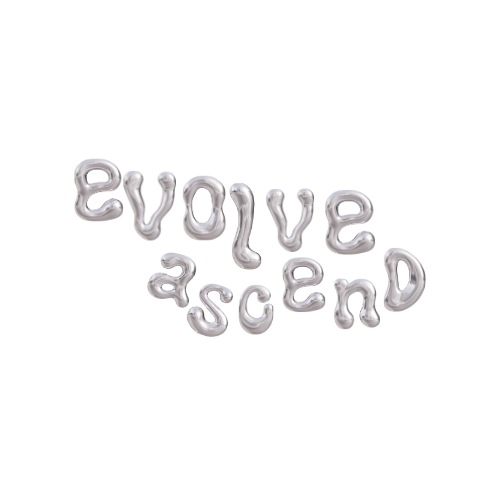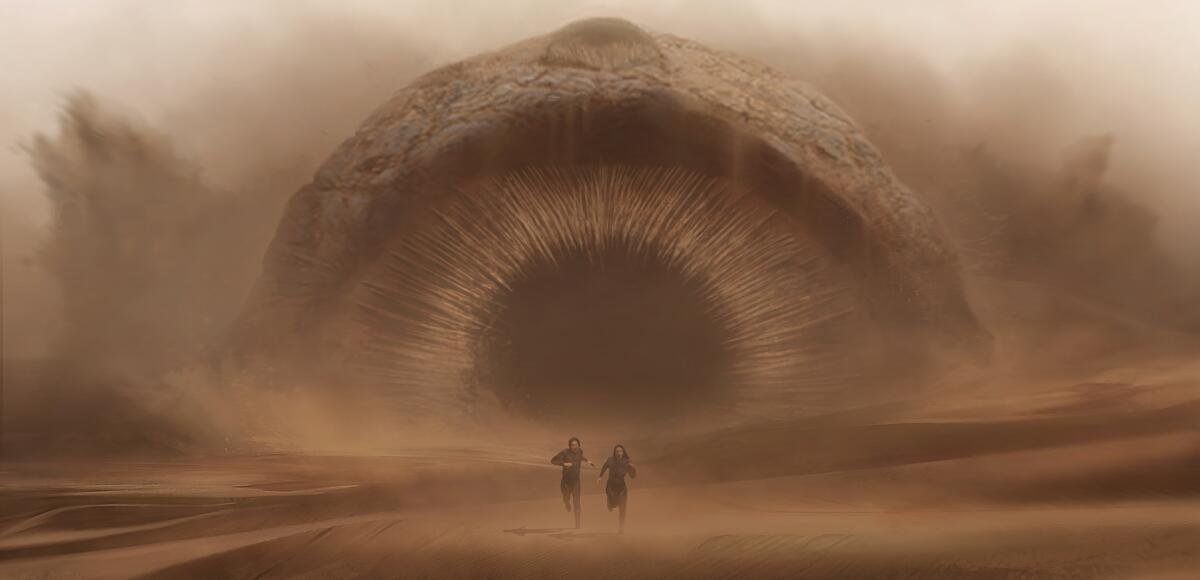Mega Analysis of the Esoteric Easter Eggs in the Dune Universe
I first watched David Lynch's “Dune” in 2012, right after I tried DMT for the first time. As a fan of Lynch's signature surreal, dream-like cinematic visions (Mulholland Drive is a personal favorite), this entry into the world of Arrakis and Paul Atreides's odyssey was prescient and profoundly affecting.
When I heard Denis Villeneuve was taking a stab at a remake, I was thrilled, albeit a little apprehensive, because I had a hard time picturing Timothee Chalamet filling Kyle MacLachlan’s shoes. However, Zendaya as Chani was, as they say, "Chef's Kiss." Villeneuve's films, “Arrival” and “Bladerunner: 2049,” were both masterfully executed, so I was confident of the work he would do with this sci-fi epic.
Needless to say, I was absolutely ecstatic over the first “Dune.” I recently watched “Dune: Part Two,” which was more than I could have hoped for—and, as a person who loves going to the movies, made for a perfect popcorn-in-hand theater-going experience. My only regret is not being able to see it in IMAX.
In celebration of “Dune: Part Two,” I will explore some of the history of the Dune universe, or multiverse, and then lead into some esoteric “Easter Eggs” to add some more depth to the series, to open your mind to the worlds within this world and the layers of genius within the saga.
This article will be the first of a new series of esoteric film analyses on our site. For a primer on a "beginner's guide" to viewing cinema through this lens, it may be worth checking out this article: A Beginner’s Guide to Decoding Esoteric Symbolism in Film.
History of “Dune”
The Novel
Frank Herbert's "Dune" is a science fiction novel first published in 1965, when the author was 44. It is a complex and intricately plotted story with deep characters and a meticulously constructed universe. The novel has been a source of inspiration for generations of readers and writers.
The story is set in the distant future, where a feudal interstellar society governs the known universe. The heart of the story is the desert planet Arrakis, the only source of the most valuable substance in the universe, the spice melange. The spice has the ability to extend human life, enhance mental and psychic abilities, and is crucial for space navigation. Controlling Arrakis is a coveted and dangerous endeavor.
The plot primarily follows the young Paul Atreides, whose noble family, the House Atreides, is given stewardship of Arrakis, displacing the planet's previous rulers, the House Harkonnen. This move is part of a complex political intrigue that pits the Atreides against the Harkonnens and draws in various other factions, including the Emperor and the mysterious, powerful space-faring guild known as the Spacing Guild.
Also central to the "Dune" narrative are the Bene Gesserit, a secretive and powerful sisterhood with advanced mental and psychic training. Lady Jessica, Paul's mother, is a member of the Bene Gesserit, and she has trained him in many of their techniques.
"I must not fear. Fear is the mind-killer. Fear is the little death that brings total obliteration. I will face my fear. I will permit it to pass over me and through me. And when it has gone past, I will turn the inner eye to see its path. Where the fear has gone there will be nothing. Only I will remain." - Frank Herbert
Upon their arrival in Arrakis, the Atreides family is betrayed, which leads to a devastating attack by the Harkonnens. Paul and his mother, Lady Jessica, escape into the desert, where the Fremen, the native people of Arrakis, take them in. The Fremen live in the deep desert, have adapted to the harsh environment, and have long dreamed of terraforming their world into a more habitable place.
Paul, leveraging his advanced training and the mystique surrounding his birthright, emerges as a leader among the Fremen. He is seen as the fulfillment of a prophecy, a messiah figure — the Kwisatz Haderach — who could lead them to freedom and transform Arrakis.
As Paul embraces his destiny, he also begins to tap into unprecedented psychic abilities, partly due to his exposure to the spice, as well as his bloodline. These abilities, along with his natural leadership and combat skills, enable him to unite the Fremen and wage a guerrilla war against the Harkonnen and their Imperial allies.
The novel explores themes of geopolitics, religion, ecology, and the human struggle for power, control of resources, and free will vs. destiny. Paul's journey is not only a physical battle for control of Arrakis but also a spiritual and philosophical quest to understand his place in the universe and the implications of his burgeoning power.
"Dune" is the first book in a series that expands on these themes and explores the consequences of Paul's rise to power, as well as the far-reaching impact on his descendants and the universe at large. The series delves into complex questions about governance, environmental stewardship, and the ethics of genetic manipulation and prophecy.
David Lynch's "Dune" (1984)
David Lynch's 1984 film adaptation of Dune is renowned for its visually striking imagery and features a notable cast, including Kyle MacLachlan, Sting, Patrick Stewart, and Sean Young.
However, Lynch's version received mixed reviews for its deviation from the source material and the complexity of its plot. Some viewers, who were perhaps new to Lynch’s signature (albeit often disorienting) style, found it confusing.
Despite its controversies, the film has garnered a cult following and is often discussed for its ambitious scope and the director's distinctive world-building.
“Jodorowsky's Dune" (2013)
Psychedelic filmmaker Alejandro Jodorowsky's failed attempt to adapt "Dune" in the 1970s is a fascinating chapter in cinematic history. Although his vision for the film was never realized, it is considered one of the greatest movies never made.
Jodorowsky's ambitious plans included contributions from Salvador Dalí, Orson Welles, and Pink Floyd. The documentary "Jodorowsky's Dune" (2013) explores this unproduced epic, highlighting its potential impact on the science fiction genre and the subsequent influence it had on future sci-fi films.
Denis Villeneuve's "Dune" (2021) and "Dune: Part Two" (2024)
Denis Villeneuve's adaptation of "Dune," released in 2021, received widespread acclaim for its faithful adaptation of the source material, visual effects, and performances.
Villeneuve managed to capture the complex themes and vast scope of Herbert's universe, making it accessible and engaging to modern audiences.
The success of the first film led to the greenlighting of "Dune: Part Two," which was released on March 15th, 2024. It had an opening weekend of $81.5 million in box office sales, and with a 94% score on Rotten Tomatoes — it’s safe to say this is a hit.
Confirmation of a “Dune: Part Three” has yet to be revealed, but judging by the success and critical acclaim, it seems on the likely horizon.
Now, Let’s Explore the Esoteric “Easter Eggs”
Psychedelia
Spice Melange and DMT
The spice melange in "Dune" functions as a critical element for space navigation, extending human life and enabling a form of prescience or future sight.
“He who controls the spice controls the universe.” ― Frank Herbert, Dune
This fictional substance shares conceptual parallels with dimethyltryptamine (DMT), a naturally occurring psychedelic compound that is often described as facilitating profound shifts in consciousness and perceptions of reality.
DMT users report encountering other dimensions and entities and insights into the nature of existence that echo the spice-induced abilities portrayed in "Dune."
In both instances, these substances act as tools for mind expansion, bending perceived space and time and suggesting a more profound, interconnected fabric of reality that can be accessed through altered states of consciousness.
The Water of Life and Initiation Rites
The Water of Life in “Dune” closely mirrors the ritualistic processes observed in various historical and cultural initiation practices. Extracted from the indigenous sandworms of Arrakis, this lethal yet potent substance offers those who survive its consumption access to unparalleled psychic insights, including the ability to perceive the interwoven fabric of past, present, and potential futures and a profound connection with the collective human psyche.
For Paul, ingesting the Water of Life is not just a rite of passage; it is a crucible that cements his transformation into a figure of messianic proportions within Fremen society. This pivotal experience resonates with the thematic essence of initiation rites across diverse mystical and esoteric traditions, where the motif of death and rebirth serves as a conduit for profound personal and spiritual renewal.
The parallels extend to the Freemasons’ symbolic enactment of death and rebirth, intended to impart deep moral and spiritual revelations akin to the transformative rebirth Paul undergoes. This motif of personal dissolution and subsequent enlightenment is further mirrored in the shamanic traditions surrounding plant medicines such as ayahuasca and iboga, where participants undergo profound introspective journeys leading to mental and perceptual enhancements. These practices underscore the transformative potential of facing and overcoming existential thresholds mediated by mind-altering substances.
Moreover, the Eleusinian Mysteries of ancient Greece encapsulated an initiatory journey promising insights into the divine and the afterlife, achieved through symbolic death and rebirth. This ancient practice underscores the Water of Life’s role in "Dune" as a metaphorical and literal passage through death, leading to an awakening marked by enhanced consciousness and foresight.
Word Play
Bene Gesserit
"Bene Gesserit" seems to ostensibly amalgamate linguistic elements from Hebrew and Latin, each contributing to the thematic resonance of the sisterhood's portrayal.
The prefix "Bene" (בנה) in Hebrew translates to "sons of" or "children of," a nomenclature typically employed to denote lineage or tribal affiliation. This etymological choice is particularly poignant when considering the matriarchal structure of the Bene Gesserit.
By appropriating a term conventionally associated with patrilineal descent and recontextualizing it within a framework of female empowerment and agency, Herbert effectively subverts traditional gender norms, underscoring the sisterhood's role as a formidable and autonomous force within the universe.
Conversely, there may also be an influence in Latin with the selection of the term "Gesserit," derived from "gerere," to bear or to carry, infuse the term with connotations of bearing responsibility, conducting oneself, or carrying out actions. This choice dovetails with the Bene Gesserit's multifaceted role as manipulators of genetic lineages, influencers of political dynamics, and custodians of profound esoteric knowledge and physical prowess. The conjugation "Gesserit," in the perfect tense, suggests a completed action or a state brought about by past actions, which may allude to the historical and ongoing impact of the Bene Gesserit's machinations across generations and their calculated shaping of galactic events.
The interplay between the Hebrew and Latin linguistic elements in the term "Bene Gesserit" highlights their paradoxical position as both inheritors and architects of their own legacy, embodying a synthesis of biological determinism and strategic agency. This choice seems to serve not merely as a designation but as a thematic encapsulation of the Bene Gesserit's complex identity within the "Dune" narrative—a testament to Herbert's nuanced world-building and thematic depth.
Kwisatz Haderach
According to the selective breeding program of the Bene Gesserit, the Kwisatz Haderach in the "Dune" universe represents a pinnacle in human evolution. This super-being is envisioned as possessing the ability to access not only the memories of all his male ancestors, as other men might, but uniquely, those of his female ancestors as well, a capability traditionally accessible only to the women of the Bene Gesserit through their ritual use of the spice melange.
The term "Kwisatz Haderach" draws inspiration from the Hebrew phrase “Kefitzat Haderech,” which translates to “the jumping of the road” or “shortening of the way.” In Jewish folklore, this term refers to a miraculous form of travel that allows one to cover vast distances instantaneously or in a very short period of time, echoing the Kwisatz Haderach’s ability to transcend normal human limitations and, metaphorically, to navigate the future and past in a way that no other being can.
Friedrich Nietzsche's idea of the Übermensch, or "overman," is presented in his work "Thus Spoke Zarathustra." Nietzsche envisions the Übermensch as an individual who has overcome the human condition and established a new set of values unbound by the traditional moralities of society. This figure is meant to embody the ultimate potential of human creativity, strength, and intellectual power, transcending the limitations and mediocrities of ordinary human life. The Übermensch is not constrained by the same moral codes that govern the mass of humanity; instead, he creates his own values and lives by them, leading humanity away from nihilism and towards a more profound existential purpose.
In "Dune," the Kwisatz Haderach shares similarities with Nietzsche's Übermensch in the sense of transcending human limitations and possessing the capacity to redefine humanity's understanding of itself and its destiny. Paul Atreides, as the Kwisatz Haderach, embodies these qualities by breaking free from the prescriptive path laid out by the Bene Gesserit and choosing his own way, challenging the established powers of the universe. His ability to see into the future and access the wealth of ancestral memory gives him a perspective and wisdom beyond the conventional, allowing him to navigate and influence the socio-political landscape of the "Dune" universe in unprecedented ways.
Lisan al Gaib
"Lisan al Gaib" is a term used by the Fremen to denote an off-world prophet with insights into hidden or unseen realities. The term seems to blend with Arabic roots, with "Lisan" meaning "Tongue" and "al Gaib" translating to "The Hidden" or "The Unseen," suggesting a figure who articulates truths beyond ordinary perception.
This choice of words hints at a more profound, possibly metaphysical significance, drawing from Sufi concepts to portray a prophet who reveals the unseen dimensions of reality.
"Lisan al Gaib" might also relate to "الغريب" (al graib), meaning "The Stranger" or "The Otherworldly," reinforcing the idea of an alien figure with supernatural insight. This nuanced interpretation underscores the embodiment of the word as not merely a foreigner but as a profound communicator of the unknown, embodying both mystique and otherworldly wisdom.
Muad'Dib
The "Muad'Dib" desert mouse from “Dune: Part Two”
Paul Atreides's own selection of "Muad'Dib" as his name upon his assimilation into the Fremen culture is a potent — and layered — metaphor. In the Dune universe, this name refers to a small yet resilient desert mouse admired by the Fremen for its ability to survive in one of the harshest environments known.
This mouse, seemingly insignificant, embodies qualities of cunning, endurance, and the capacity to thrive under adverse conditions. The choice is symbolic, positioning Paul as a figure who, despite seeming insignificance on the grand cosmic scale, holds the power to effect monumental change.
The metaphor extends deeper when considering the Arabic word مُؤَدِّب (mu'addib), meaning "teacher" or "private tutor." Historically, a mu'addib was entrusted with the education of young members of the nobility, shaping minds to navigate complex socio-political landscapes. The parallel drawn between Paul's chosen name and the Arabic term underscores his role not just as a leader but as an enlightener.
Shai-Hulud
The term "Shai-Hulud," used to describe the colossal sandworms of Arrakis, draws its etymological roots from Arabic, blending both literal and symbolic meanings to enrich the narrative depth of these creatures.
The Arabic word "Shai" loosely translates to "Thing," encompassing a broad spectrum of entities, while "Hulud" signifies "eternity" or "immortality," conjuring notions of timelessness and perpetual existence. When these components are combined, "Shai-Hulud" encapsulates a profound conceptual blend that transcends its literal translation, evoking a sense of awe and reverence toward these creatures.
In the cultural lexicon of the Fremen, "Shai-Hulud" is imbued with additional layers of meaning. It is interpreted as "Old Man of The Desert," "Old Father Eternity," or "Grandfather of the Desert." These translations reflect the Fremen's veneration of the sandworms as not merely creatures of their environment but as integral, divine figures within their cosmology and way of life.
Usul
Upon his integration into the Fremen society, Paul Atreides is given the “sietch” (“community” or “village” in Fremen) name "Usul," which signifies the "base of the pillar" in the Fremen language.
The term "Usul" finds resonance in Islamic scholarship and culture, particularly in the phrases "Usul al-fiqh" and "Usul al-Din." "Usul al-fiqh," or the principles of Islamic jurisprudence, refers to the foundational methodologies used in deriving legal rulings from the Quran and Hadith.
This concept underscores the importance of a solid and principled basis in understanding and interpreting laws that govern ethical and religious conduct. Similarly, "Usul al-Din" pertains to the principles of the Islamic religion, encompassing the core beliefs and tenets that constitute the faith's theological foundation. These concepts collectively emphasize the significance of foundational knowledge and the grounding of beliefs and practices in a structured, principled framework.
Moreover, the term "Usul" connects to the realm of Ottoman classical music, denoting a rhythmic pattern or cycle known as "usul" in Turkish. These rhythmic cycles form the structural basis of musical compositions, providing a foundational pattern that guides the melodic flow and the dynamic expressions within a piece. This musical application of "Usul" highlights the importance of underlying structures that govern creative expression and the orderly progression of themes and variations.
Influence from Islamic Mysticism
Sufism
The influence of Islamic mysticism, and particularly that of Sufism, is evident in the development of its central themes and character arcs in “Dune.”
Sufism, known as Tasawwuf, prioritizes a personal and deep connection with the Divine through devotion, love, and the inner purification of the self. It seeks a direct, experiential knowledge of God, often employing practices that extend beyond orthodox rituals to achieve the soul's enlightenment and purification. This mystical Islamic tradition underscores the importance of tazkiyah, or the soul's purification process, which involves overcoming ego and worldly desires to attain spiritual purity and closeness to God. Sufis engage in dhikr (remembrance of God), meditation, and Sama (listening to poetry and music) as means to cultivate divine love and consciousness.
Sufism emphasizes the importance of a spiritual guide or master, known as a Sheikh or Pir, who mentors disciples on their spiritual journey. This relationship is pivotal, as the guide helps navigate the complex path toward spiritual realization and union with God. Sufi teachings often stress the unity of all existence, viewing the divine essence as permeating the entire universe. This leads to a profound respect for all life and a call to see beyond external differences.
Sufi orders, or Tariqas, are brotherhoods or sisterhoods that follow the teachings and spiritual practices of a particular Sufi master. These orders serve as communities of like-minded individuals who support each other's spiritual growth and pursuit of divine love and knowledge. The orders vary in their practices and rituals but share the common goal of seeking a closer relationship with God.
Paul's transformative journey on Arrakis, filled with trials, visions, and a deepening connection to the desert and its people, mirrors the Sufi path of self-discovery and the quest for a deeper understanding of the universe's mystical forces. The emphasis on inner wisdom, visions, and the importance of a guide or mentor in Paul's journey can be seen as reflections of the Sufi pursuit of spiritual truth and enlightenment.
Jihad
In Islamic theology, "jihad" signifies a multifaceted concept encompassing both an individual's internal struggle against sin (greater jihad) and a collective effort to protect or promote the faith against external threats (lesser jihad). This dual interpretation underscores a commitment to moral integrity and social justice, guided by the principles of the faith.
In "Dune," jihad is recontextualized within a narrative that intertwines personal destiny with widespread socio-political upheaval. Paul’s journey embodies the internal jihad as he grapples with his foreseen role in a universe-spanning holy war, reflecting on the moral implications of his actions and the burden of leadership.
Concurrently, the Fremen's armed rebellion against the oppressive forces of Arrakis captures the essence of lesser jihad, highlighting the struggle for autonomy, justice, and religious fulfillment. This nuanced portrayal invites an examination of jihad's ethical dimensions, challenging simplistic views by emphasizing its complexity and the inherent tensions between destiny, morality, and the pursuit of righteousness.
Water
Water holds a profound place within Islam, symbolizing purity, life, and the divine blessing. Ritual purification with water (wudu) is a prerequisite for prayer, underscoring water's essential role in spiritual cleanliness and readiness to engage with the divine.
In "Dune," the scarcity of water on Arrakis elevates its value to a sacred status, with the Fremen's conservation practices and rituals reflecting a deep spiritual reverence for water. This mirrors the Islamic emphasis on water's sanctity and the ethical implications of its use.
Djinn
In Islamic theology, djinn are supernatural beings created from smokeless fire. They possess free will and the ability to influence the material world. They embody the unseen, a realm beyond human perception, which is acknowledged and respected within Islamic spirituality.
While the novel "Dune" does not explicitly reference djinn, there is a reference to them in “Dune: Part Two.”
The Fatboy Slim and Christopher Walken Connection
I would be remiss not to mention the significance of Christopher Walken starring in “Dune: Part Two” as Shaddam IV.
Big if you know this, but Fatboy Slim’s song “Weapon of Choice” seems to have been loosely inspired by Dune, namely the lyrics: “Walk without rhythm, it won’t attract the worm” (Shai-Hulud avoidance technique 101) and “Don’t be shocked by the tone of my voice—check out my new weapon, weapon of choice” (“The Voice” in Dune turns words into weapons).
Walken tap-danced his way through the epic music video for that song back in 2000, and seeing him on the screen in 2024 is a nice full—circle moment, bending space and time from then to now.
Conclusion
This list only scratches the surface of Dune's brilliance, but I hope it provides some deeper insight into this multifaceted and enlightening world of story.
Stay tuned for more esoteric analyses, and please feel free to share your thoughts on what we've discussed here in the comment section below!









